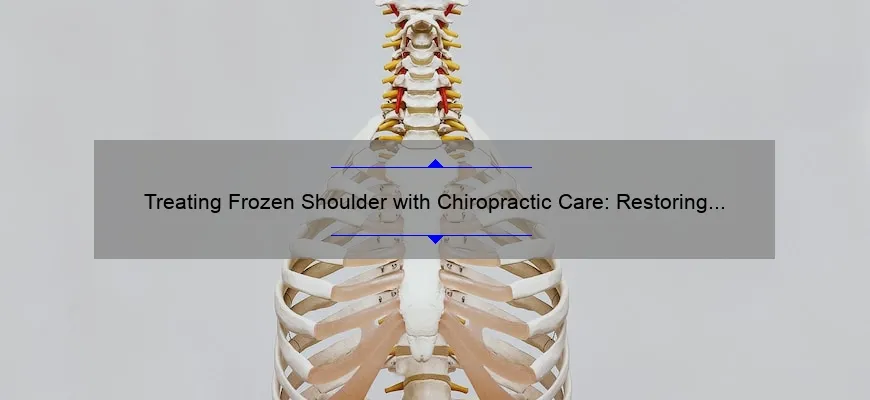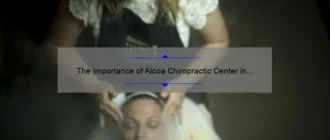Frozen shoulder, or adhesive capsulitis, is a condition characterized by pain and stiffness in the shoulder joint. While chiropractic care can help improve range of motion and alleviate pain, further research is needed to determine its effectiveness in treating frozen shoulder specifically. It is recommended to consult with a healthcare professional for an accurate diagnosis and appropriate treatment plan.
What is frozen shoulder and how can chiropractic care help?
Frozen shoulder, also known as adhesive capsulitis, is a condition characterized by pain and stiffness in the shoulder joint. It occurs when the connective tissue surrounding the shoulder joint becomes thickened and tight, making it difficult to move the shoulder properly.
Chiropractic care can be beneficial for individuals with frozen shoulder. Chiropractors are trained to assess the musculoskeletal system and correct structural imbalances or joint dysfunctions that may be contributing to the frozen shoulder symptoms. They use various manual techniques, including adjustments, mobilizations, and soft tissue therapies, to restore proper movement and function to the shoulder joint.
Chiropractic care can also help alleviate pain and inflammation associated with frozen shoulder through targeted therapies and exercises. Chiropractors may utilize modalities such as ultrasound, electrical stimulation, or cold therapy to reduce pain and promote healing. Additionally, they can provide specific stretching and strengthening exercises to improve range of motion and mobility in the shoulder.
While chiropractic care can be beneficial in managing frozen shoulder, it is important to note that individual outcomes may vary. It is advisable to consult with a qualified chiropractor to determine the most appropriate treatment plan based on the specific condition and individual needs.
Can chiropractic adjustments provide relief for the pain and stiffness of frozen shoulder?
Yes, chiropractic adjustments can provide relief for the pain and stiffness of frozen shoulder. Chiropractors use various techniques to manipulate the spine and joints, which can help improve shoulder mobility, reduce pain, and relieve stiffness associated with frozen shoulder. However, it is essential to consult with a chiropractor or healthcare professional to determine if chiropractic adjustments are appropriate for your specific condition.
Is chiropractic treatment a safe and effective alternative for managing frozen shoulder?
Chiropractic treatment can be a safe and effective alternative for managing frozen shoulder, but it may not work for everyone. It involves manual manipulation of the joints and soft tissues to improve range of motion and decrease inflammation. However, it is important to consult with a qualified chiropractor and get a proper diagnosis to determine if chiropractic treatment is suitable for your specific condition. Other treatment options such as physical therapy or medication may also be necessary in conjunction with chiropractic care for optimal results.
How does chiropractic care address the underlying causes of frozen shoulder?
Chiropractic care can address the underlying causes of frozen shoulder by focusing on the musculoskeletal system and alignment of the spine. The primary underlying cause of frozen shoulder is often poor posture or misalignment in the spine or other joints in the body. Chiropractors can use various techniques such as spinal adjustments, joint mobilizations, and soft tissue therapies to correct these misalignments and improve overall musculoskeletal function. By restoring proper alignment, chiropractic care can reduce inflammation, relieve tension on the surrounding muscles and tendons, and improve range of motion in the shoulder joint. Additionally, chiropractors may provide exercises and stretches to strengthen the muscles surrounding the shoulder joint and help prevent future problems. Overall, chiropractic care aims to address the root causes of frozen shoulder, rather than simply providing temporary pain relief.
Are there specific chiropractic techniques that are beneficial for treating frozen shoulder?
Yes, there are specific chiropractic techniques that can be beneficial for treating frozen shoulder. One common technique is joint mobilization, where the chiropractor uses manual manipulation to improve the range of motion and flexibility in the affected shoulder joint. Another technique is soft tissue therapy, such as deep tissue massage or myofascial release, which helps to reduce muscle tension and improve circulation in the surrounding tissues. Additionally, chiropractors may utilize exercises and stretches to strengthen the shoulder muscles and improve stability. It’s important to consult with a chiropractor who specializes in treating frozen shoulder to determine the most appropriate techniques for an individual’s specific condition.
Can chiropractic care help improve range of motion and mobility in a frozen shoulder?
Yes, chiropractic care can help improve range of motion and mobility in a frozen shoulder. Chiropractors can use various techniques such as adjustments, manipulations, and stretches to reduce pain and inflammation, improve joint function, and restore mobility in the shoulder joint. Additionally, chiropractors may recommend exercises and provide lifestyle advice to help maintain and improve the range of motion gained through chiropractic care. It’s important to consult with a chiropractor or healthcare professional for an accurate diagnosis and personalized treatment plan for a frozen shoulder.
What are the benefits of combining chiropractic care with other treatment approaches for frozen shoulder?
Combining chiropractic care with other treatment approaches for frozen shoulder offers several benefits. Firstly, chiropractic adjustments can help restore proper alignment and mobility to the shoulder joint, which is essential for alleviating pain and promoting healing. This can be especially beneficial when used in conjunction with other therapies, such as physical therapy, as it can enhance the effectiveness of those treatments.
Additionally, chiropractic care can help address underlying spinal or postural issues that may be contributing to the frozen shoulder. By correcting any imbalances or dysfunctions in the spine, it can further support the healing process and prevent future recurrences of the condition.
Furthermore, combining chiropractic care with other treatment approaches can provide a holistic and comprehensive approach to healing. By utilizing a multidisciplinary approach, patients can benefit from a range of therapies and techniques, each targeting different aspects of the condition. This can lead to faster recovery, increased range of motion, and improved overall function of the shoulder joint.
Overall, combining chiropractic care with other treatment approaches for frozen shoulder can offer a synergistic effect, maximizing the benefits of each therapy and providing a well-rounded approach to healing.
Are there any risks or side effects associated with chiropractic treatment for frozen shoulder?
Yes, there are some risks and potential side effects associated with chiropractic treatment for frozen shoulder. These may include:
1. Aggravation of symptoms: Chiropractic adjustments and manipulations may temporarily increase pain or discomfort in the shoulder region.
2. Nerve injury: There is a small risk of nerve damage during chiropractic adjustments, which can lead to weakness, numbness, or tingling in the affected arm or hand.
3. Muscle soreness or stiffness: After a chiropractic session, it is common to experience some muscle soreness or stiffness as the body adjusts to the treatment.
4. Rib or spinal injury: If the chiropractor applies excessive force or uses incorrect techniques, there is a possibility of rib or spinal injury.
5. Adverse reactions: Some individuals may experience mild side effects such as headache, fatigue, dizziness, or nausea after chiropractic treatment.
It is essential to consult with a qualified chiropractor and discuss all potential risks before considering chiropractic treatment for frozen shoulder.
Can chiropractic care prevent or help avoid frozen shoulder from recurring?
Chiropractic care has the potential to help prevent or avoid recurring frozen shoulder to some extent. Chiropractors focus on improving spinal alignment and joint function, which can indirectly affect shoulder mobility and reduce the risk of frozen shoulder. Additionally, chiropractors may utilize techniques such as joint mobilization, soft tissue therapy, and exercises to improve range of motion and strengthen the shoulder muscles. However, the effectiveness of chiropractic care in preventing or avoiding frozen shoulder recurrence may vary from person to person, and it is recommended to consult with a healthcare professional for a comprehensive evaluation and personalized treatment plan.
Is it possible for frozen shoulder to resolve completely with chiropractic care?
Frozen shoulder, also known as adhesive capsulitis, is a condition characterized by pain and stiffness in the shoulder joint. While chiropractic care can provide some relief for frozen shoulder, it may not completely resolve the condition on its own. Chiropractors use a variety of techniques such as adjustments, mobilizations, soft tissue therapy, and exercises to improve joint mobility and reduce pain. However, it is important to note that frozen shoulder is a complex condition that often requires a multidisciplinary approach including physiotherapy, stretching exercises, and sometimes even medication or surgery to achieve full resolution. Therefore, while chiropractic care can be beneficial as part of a comprehensive treatment plan, it may not be the sole solution for completely resolving frozen shoulder.
| Topic | Description |
|---|---|
| Title | Frozen Shoulder And Chiropractic |
| Introduction | A brief overview of frozen shoulder and the potential benefits of chiropractic care. |
| Definition | Explanation of frozen shoulder, also known as adhesive capsulitis, its symptoms, and causes. |
| Chiropractic Treatment | Information on how chiropractors approach frozen shoulder treatment, focusing on spinal adjustments, mobilization techniques, and therapeutic exercises. |
| Benefits | Highlighting the potential benefits of chiropractic care for frozen shoulder, such as pain relief, increased range of motion, and improved functionality. |
| Case Studies | Presenting real-life cases where individuals with frozen shoulder experienced positive outcomes after chiropractic treatment. |
| Precautions | Listing any precautions or contraindications chiropractic care may have for individuals with frozen shoulder, such as severe inflammation or certain medical conditions. |
| Conclusion | A summary of the main points discussed, acknowledging that individual results may vary and suggesting consulting with a chiropractor for personalized advice. |






